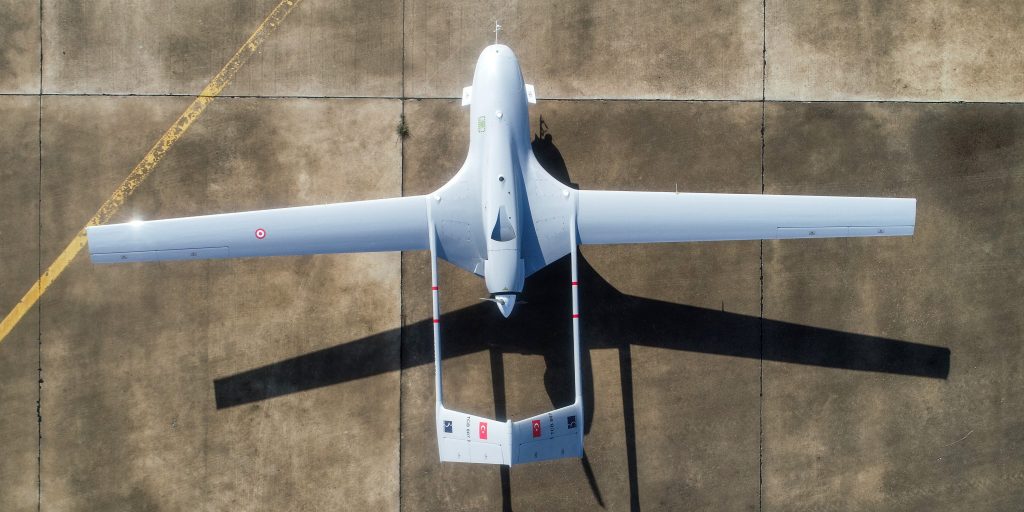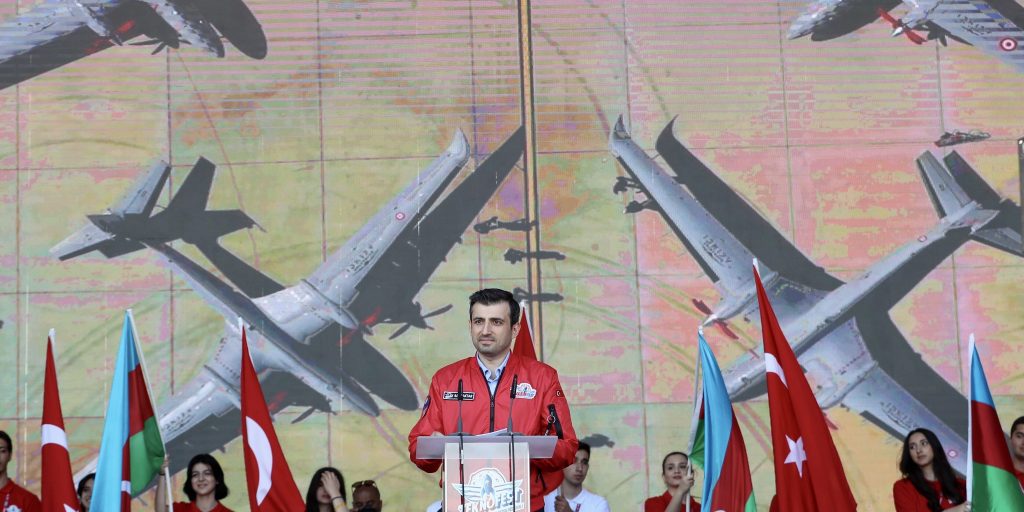- "The whole world" wants to buy the Bayraktar TB2 drone, its designer recently told Reuters.
- Turkish firm Baykar Technologies designed tge aerial weapon, which launches laser-guided missles.
- The drone has been used to devastating effect by Ukrainians repelling Russian ground forces.
The popularity of a powerful aerial weapon that's been used to devastating effect in the skies above Ukraine is catapulting its manufacturer's business prospects to new heights, its creator recently said.
"The whole world is a customer" trying to obtain the Bayraktar TB2 drone, Selcuk Bayraktar, designer of the Turkish-made weapon, told Reuters at an exhibition in Azerbaijan.
"Bayraktar TB2 is doing what it was supposed to do — taking out some of the most advanced anti-aircraft systems and advanced artillery systems and armored vehicles," said Bakyraktar, whose father Ozdemir Bayraktar founded Baykar Technologies in Istanbul in the 1980s.
The younger Bayraktar, who serves as the company's chief technology officer, is the son-in-law of Turkish President Recep Tayyip Erdoğan. The elder Bayrakter died last year at age 72, the company said.
Throughout Russia's offensive campaign, Ukrainian forces have used the drones to decimate Russian weapons including tanks and Buk surface-to-air missile launchers. Bayraktar drones prowl the sky at up to 25,000 feet, raining laser-guided rockets down on enemies below.
The drones have been so effective at helping Ukraine repel Russia forces that Mikhail Podolyak, a senior Ukrainian official and advisor to President Volodymyr Zelensky, hailed the drones as "super-weapons" in a social media post alongside Bayraktar in March. Podolyak said that the weapon had left Russian tanks "burning flawlessly."
"They'll continue to burn, as Bayraktars ideally fulfill any task — imperceptibly, frighteningly, destructively," he added.

Bayraktar expressed satisfaction with the weapon's widespread use in the Ukraine conflict, telling Reuters: "It is an illegal invasion so [the drone] is helping the honorable people of Ukraine defend their country."
The success of the weapon in the Ukraine conflict has attracted more business internationally. Reuters reported that the TB2 has been used in other conflict zones including Syria, Libya, and Iraq, and has gone on to become a cornerstone of "Turkey's global defense export push."
Earlier this month, the government of Lithuania organized an effort to raise more than $5 million from its own citizens to purchase a TB2 drone for the Ukrainian military. The fundraising effort took just three days, with most donations from ordinary Lithuanians amounting between €10 to €500, the Lithuanian government said on Twitter.
Taxi drones will 'revolutionize' inner-city transportation
Aside from advanced weapons tech, Bayraktar told Reuters that his company is working on developing "taxi drones" to help augment inner-city transportation.
"If you look at the longer time horizon, we are working on taxi drones," he said. "For that we need to develop more higher-level autonomy technolgoy — which is AI basically — but it will revolutionize how people will be transported in cities."
But there's no doubt that the use of the Bayraktar drone in Ukraine has put Baykar Technologies on the global map for offensive weapons technology.
Bayraktar said now the company is developing a next-generation iternation of the TB2 — the TB3, which will have foldable wings and can make use of "short-runway aircraft carriers," Reuters reported.
Other existing drones the company has developed aside from the TB2 have notched impressive feats, as well.
Baykar's Akinci drone, which flies unmanned and has a longer and wider body than the TB2, recently completed an "unseen" flight from the far western reaches of Turkey to Azerbaijan, the company said in a news release. The journey lasted for five hours during which the drones flew more than 1,200 miles across three countries — which the firm called "a first in Turkish aviation history."

